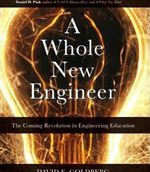David E. Goldberg, president of Big Beacon and emeritus professor of engineering at the University of Illinois at Urbana-Champaign, and Mark Somerville, professor of engineering and associate dean at Franklin W. Olin College of Engineering, are two men on a daring mission. Their goal is to transform the entire world of engineering. Their objective is simple – they want to humanize the engineering profession.
Their new book, “A Whole New Engineer: The Coming Revolution in Engineering Education,” rocks the world of staid stereotypes people have toward engineers and engineering schools. In place of the Dilbert-like, technically narrow, socially inept nerd educated in a process that is a cross between a math-science death march and a fraternity hazing, Goldberg & Somerville imagine a whole new engineer, a whole new engineering education, and a practical process to achieve them both.
Their new vision of engineering, which mining engineering students could embrace, is one where students and professionals are encouraged to follow their passions, work on real projects in teams, focus on solving the compelling needs of people and society (not just technical problems), develop an entrepreneurial mindset to take risks and get things done, and work harder and have more fun than they ever thought possible – awakening their sense of purpose and intrinsic motivation to learn.
“Times have changed,” said Goldberg. “The needs of society have evolved. The obedient engineer of the 1950s has been replaced by a quest for the next Steve Jobs. To find her or him, joy is replacing fear, trust is replacing suspicion and courage and initiative are replacing passive obedience to authority. And these trends require that we change both how we educate and how we engineer.”
Goldberg and Somerville have created a clear, concise, easy to understand and ready-to-deploy roadmap to change that defines how to go from the stultifying kind of engineering education currently in place to an entirely new learning environment which is inspiring to those who become, educate, or employ engineers and those who rely on great engineering work for their survival, livelihood and quality of life.
Their refreshing and even eye-popping recommendations for educational reform include:
- Stop taking the crisis in engineering education for granted.
- Stop basing education system on an operating system of fear.
- Stop boring students into dull obedience.
- Stop educating engineers as technical brains on a stick.
- Stop assuming that the central actor in education is the professor.
- Stop throwing PhDs into classrooms as experts.
- Stop assuming that educational transformation can be performed by a system designed in the 11th century, a system designed to maintain the status quo.
- Stop assuming change comes through competition with school down the road.
“A Whole New Engineer” is built on the premise that while there are some very courageous educators striving to overcome the dominant educational rut, inertia, culture and bureaucracy inside colleges and universities around the world keep the old system in place. However, it no longer serves the students it attempts to educate, the parents or governments who pay the bills, the employers who hire the students, or the society that uses the services the employer provides.

